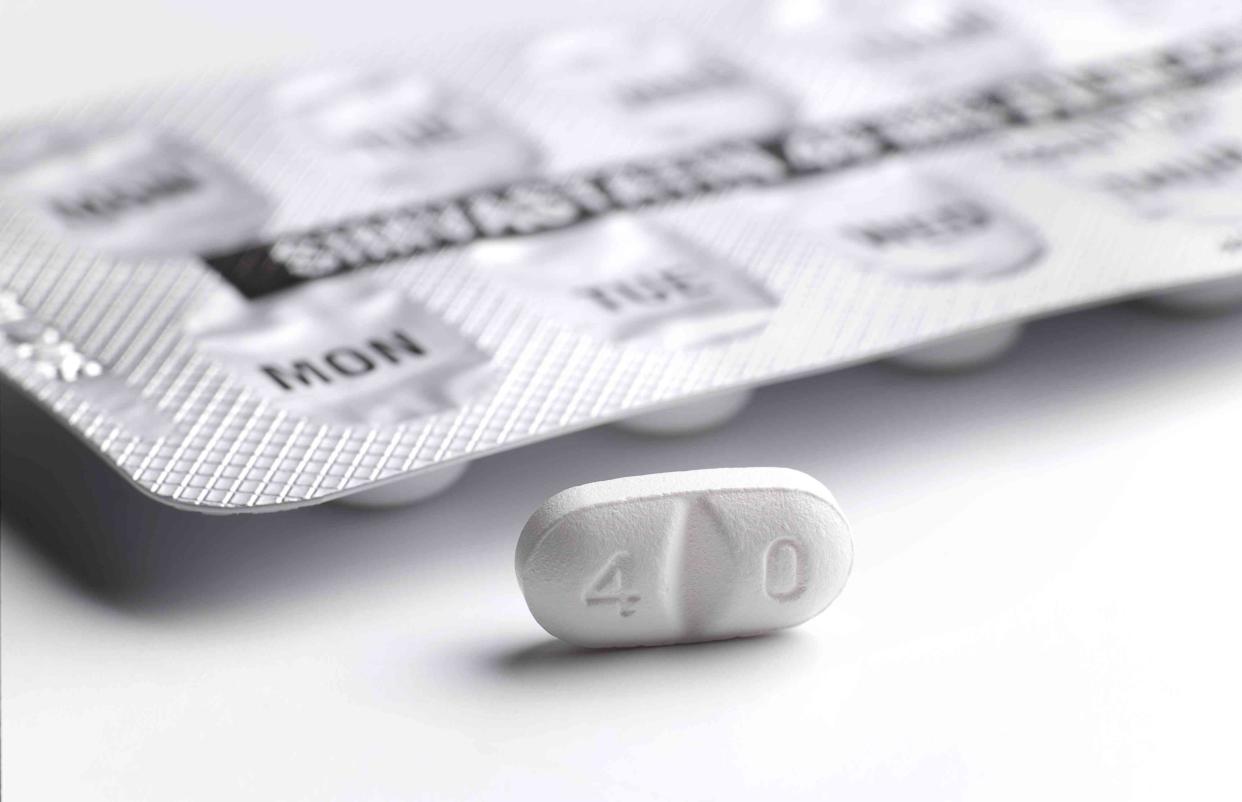Statins Can Cut Colorectal Cancer Risk in Ulcerative Colitis Patients, Study Finds

Peter Dazeley / Getty Images
Fact checked by Nick Blackmer
Key Takeaways
A recent large study indicates that patients with ulcerative colitis who take statins are at a lower risk for developing and dying from colorectal cancer.
The group on statins was also less likely to die from colorectal cancer or any cause.
Decades of research suggest that statins could have anti-cancer effects.
Cholesterol-lowering statins may have benefits beyond supporting heart health for people with ulcerative colitis, a type of inflammatory bowel disease (IBD). A recent study adds to a growing body of research indicating that the drugs can also help reduce those patients’ risk of developing and dying from colorectal cancer.
People with IBD are at especially high risk for developing colorectal cancer due to chronic intestinal inflammation.
Researchers in Sweden studied more than 10,000 people diagnosed with IBD to see whether statin use influenced their likelihood of developing colorectal cancer.
The participants who took statins had fewer cases of colorectal cancer diagnoses and deaths than those not on statins. That effect, however, was only seen in people who had ulcerative colitis, not in those with Crohn’s disease.
The study needs to be validated by more research before it is used to inform any clinical recommendations about statin use, said Jiangwei Sun, PhD, lead author of the study and a postdoctoral researcher at the Karolinska Institutet in Sweden. Nevertheless, this and similar studies point towards the potential for statins as anti-cancer drugs.
“Our findings indeed provide evidence for the clinical use of statin as a well-tolerated and affordable cancer chemopreventive agent in patients with IBD,” Sun told Verywell in an email.
Related: The Effects of Statins on Inflammation
Statins May Reduce Colorectal Cancer Risk and Death
In the study, half the study participants were on statins, and they were matched with a group of demographically similar patients not on statins.
The researchers followed up with the patients after an average of 5.6 years. During that time, 70 people in the statin group were diagnosed with colorectal cancer, compared to 90 who were not on statins.
Statin use was also shown to reduce the risk of dying from colorectal cancer. Twenty statin users died of colorectal cancer compared to 37 in the group that did not take statins.
Importantly, the findings were mostly noted in patients with ulcerative colitis, not those with Crohn’s disease. It’s possible that because relatively more participants—about 70%—were diagnosed with ulcerative colitis, researchers had a better sample population to study, according to the authors.
The researchers noted that the protective effects appeared to be driven by colon cancer rather than rectal cancer. Statin users had a lower risk of developing left-sided colon cancer and early-stage colorectal cancer than non-statin users.
This latest study joins a slew of other research into the relationship between statins and colorectal cancer. Dozens of studies found no significant link between the two, while others found up to 40% reduction in the risk of colorectal cancer after years of statin use.
Related: This New Drug Lowers Cholesterol Without the Side Effects of Statins
Taking Statins Sooner and Staying on Them Longer Could Be More Protective
The anti-cancer benefits of statins were most notable in participants who were diagnosed with IBD and started statins when they were younger and in those who had IBD for more than 10 years.
People also tended to be better protected from colorectal cancer the longer they were on statins. The researchers didn’t notice much of an effect in patients who had been taking the statins for fewer than two years.
There were also fewer deaths of any cause in the statin group than in the non-statin group. Statins are most often used to protect against heart disease and death. For that reason, Sun said he’s not surprised that the statin-using group saw a decline in all-cause mortality.
More research is required to understand the best time to start IBD patients on statins, the best treatment dose, and how long they need to be on a statin to see the protective benefits, Sun said.
Related: The Risks of Untreated Ulcerative Colitis
Why Statins May Have Anti-Cancer Benefits
Researchers have proposed several potential explanations for the anti-cancer effect of statins. For instance, when a statin acts on a metabolic pathway called the mevalonate pathway, it may not only control cholesterol but also have some anti-tumor effects. Because cholesterol is linked to the development and progression of cancer, controlling cholesterol can potentially reduce a person’s colorectal cancer risk.
Statins may also have some anti-inflammatory properties that make them especially beneficial for people with IBD.
“Much remains unknown,” Ashwin Ananthakrishnan, MBBS, MPH, a gastroenterologist at Massachusetts General Hospital, told Verywell in an email. “Studies in non-IBD patients have also shown a reduced risk of colon cancer in the general population, so there may be a mechanism independent of inflammation.”
Researchers are also looking into how statins can slow cancer cell growth and reduce resistance to chemotherapy and other cancer treatments.
Ananthakrishnan, who is unaffiliated with the study, said that it’s not possible to conclude that the protective benefit is caused by the statin. It’s also too soon to know whether statins could be prescribed as a preventive tool in people with IBD.
Sun said the analysis didn’t look into the potential effect of individual drugs and how they affect certain tumor stages. Larger international studies could give a better sense of associations, especially for people with Crohn’s disease.
Read Next: Differences Between Colorectal and Colon Cancer
What This Means For You
While the research looks promising, it’s still too soon to say that statins can be used as a prophylaxis for colorectal cancer in patients with inflammatory bowel disease. If you’re worried about your risk for colorectal cancer, talk to your provider about prevention options.
Read the original article on Verywell Health.

